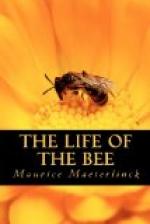the old sovereign’s will. For indeed the
ascetic workers, her daughters, regard the queen above
all as the organ of love, indispensable, certainly,
and sacred, but in herself somewhat unconscious, and
often of feeble mind. They treat her like a mother
in her dotage. Their respect for her, their tenderness,
is heroic and boundless. The purest honey, specially
distilled and almost entirely assimilable, is reserved
for her use alone. She has an escort that watches
over her by day and by night, that facilitates her
maternal duties and gets ready the cells wherein the
eggs shall be laid; she has loving attendants who
pet and caress her, feed her and clean her, and even
absorb her excrement. Should the least accident
befall her the news will spread quickly from group
to group, and the whole population will rush to and
fro in loud lamentation. Seize her, imprison
her, take her away from the hive at a time when the
bees shall have no hope of filling her place, owing,
it may be, to her having left no predestined descendants,
or to there being no larvae less than three days old
(for a special nourishment is capable of transforming
these into royal nymphs, such being the grand democratic
principle of the hive, and a counterpoise to the prerogatives
of maternal predestination), and then, her loss once
known, after two or three hours, perhaps, for the city
is vast; work will cease in almost every direction.
The young will no longer be cared for; part of the
inhabitants will wander in every direction, seeking
their mother, in quest of whom others will sally forth
from the hive; the workers engaged in constructing
the comb will fall asunder and scatter, the foragers
no longer will visit the flowers, the guard at the
entrance will abandon their post; and foreign marauders,
all the parasites of honey, forever on the watch for
opportunities of plunder, will freely enter and leave
without any one giving a thought to the defence of
the treasure that has been so laboriously gathered.
And poverty, little by little, will steal into the
city; the population will dwindle; and the wretched
inhabitants soon will perish of distress and despair,
though every flower of summer burst into bloom before
them.
But let the queen be restored before her loss has
become an accomplished, irremediable fact, before
the bees have grown too profoundly demoralised,—for
in this they resemble men: a prolonged regret,
or misfortune, will impair their intellect and degrade
their character,—let her be restored but
a few hours later, and they will receive her with
extraordinary, pathetic welcome. They will flock
eagerly round her; excited groups will climb over each
other in their anxiety to draw near; as she passes
among them they will caress her with the long antennae
that contain so many organs as yet unexplained; they
will present her with honey, and escort her tumultuously
back to the royal chamber. And order at once is
restored, work resumed, from the central comb of the
brood-cells to the furthest annex where the surplus
honey is stored; the foragers go forth, in long black
files, to return, in less than three minutes sometimes,
laden with nectar and pollen; streets are swept, parasites
and marauders killed or expelled; and the hive soon
resounds with the gentle, monotonous cadence of the
strange hymn of rejoicing, which is, it would seem,
the hymn of the royal presence.




